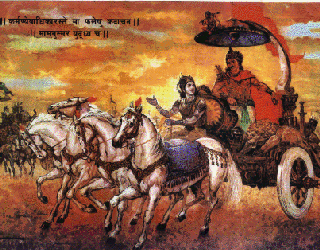
An excerpt from: Tales From The Mahabharata by Sri Chinmoy
Yudhishthira’s Worst Enemy
After the battle of Kurukshetra was over, one day Yudhishthira said to Krishna, “Krishna, we Pandavas have won. Needless to say, it is all your Grace. Otherwise, we could never have won. But you know, Krishna, in spite of our victory, something is bothering me. Do you know what it is? I have no peace of mind. Now that we have defeated the Kauravas, we are supposed to be very happy. But how can I be happy when I have no peace of mind? Why is this so? Why is it that I cannot be happy and peaceful?”
Krishna said, “Yudhishthira, O King, how can you be happy when your worst enemy is still alive?”
“My worst enemy is still alive!” Yudhishthira exclaimed. “Who is he? How is it that I do not know anything about him? Please tell me, Krishna, where my worst enemy is.”
Krishna said, “Your worst enemy is not elsewhere. It is inside you. You have been feeding and nurturing that worst enemy for a long, long time. Unless and until you have conquered that enemy, no matter what you achieve, no matter what you do for yourself or for mankind, you can never have happiness.”
“O Krishna, for God’s sake, tell me who my worst enemy is! Stop your philosophy and now illumine me!”
Krishna, with a loving heart and a smiling face, embraced Yudhishthira and said, “O Yudhishthira, you are by far the best not only among the Pandavas, but among all mortals, all human beings. Yet one enemy of yours, which is nothing short of weakness, is most destructive. And that weakness-enemy of yours is your unfortunate pride. Conquer the iota of pride that you have. Then happiness will flow into your mind, and peace will smilingly settle down inside the very depths of your heart.”
Yudhishthira said, “Your wisdom-blessing is my mind’s happiness and my heart’s peace, Krishna, my Krishna.”
– By Sri Chinmoy
Related




